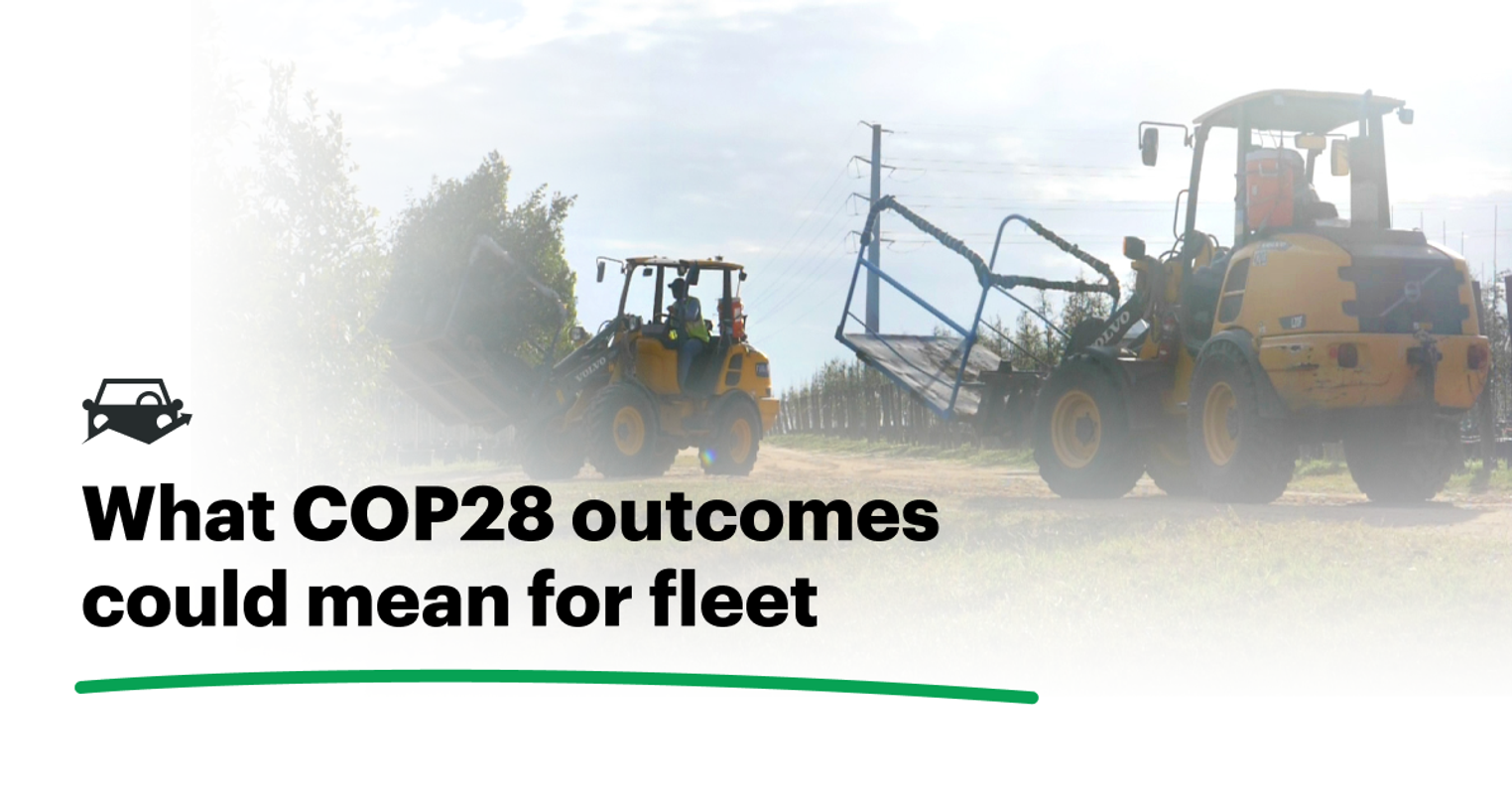COP28 Climate Conference Unveils Ambitious Goals
The 28th United Nations Climate Change Conference, known also as Conference of the Parties (COP28), wrapped in December 2023, but what could the outcomes decided there potentially mean for fleets? Let’s take a look.
Feb 5, 2024
6 min read

COP28 concluded with a number of commitments, negotiations and even a few controversies. According to the conference’s official website, “To put it simply, the COP is where the world comes together to agree on ways to address the climate crisis, such as limiting global temperature rise to 1.5 degrees Celsius, helping vulnerable communities adapt to the effects of climate change, and achieving net-zero emissions by 2050.” Attendees included “member states (or Parties) of the UN Framework Convention on Climate Change (UNFCCC) [as well as business] leaders, young people, climate scientists, Indigenous Peoples, journalists, and various other experts and stakeholders.”
The outcomes of this near global push for clean energy hold significant implications for various industries, including those relying on fleets. But clean energy isn’t the only focus; industries considered to be heavy polluters — such as the meat and dairy and agriculture industries — are also going to feel the heat of new and/or stricter regulations to meet climate goals.
Ambitious Yet Ambiguous Goals
Speaking of climate goals, the ones coming from COP28 leave something to be desired — namely specificity. “The draft [agreement] acknowledges the importance to triple global renewable energy capacity and double energy efficiency rates by 2030, yet lacks specifics,” according to The Print. “The document calls for the scaling up of technologies, including underperforming ones, to capture CO2 emissions from the atmosphere.”
This ambitious but vaguely outlined goal may set the stage for cleaner energy sources; however, the lack of specifics raises questions about the practicality of implementation. Additionally, the agreement shifted from explicit language on phasing out fossil fuels to a more nebulous commitment, which was a major point of contention. “Harjeet Singh, head of global political strategy at Climate Action Network International, said that the [text had] dropped explicit language on phasing out fossil fuels, instead opting for a vague commitment to ‘reduce both consumption and production’ by 2050.”
According to virgule, non-government organizations (NGOs) and many countries took issue with that phrasing, with French Minister of Energy Transition Agnès Pannier-Runacher and Spanish Minister Teresa Ribera both calling it “insufficient.” According to the article, “Washington also considered in this regard that the text must be ‘substantially strengthened,’ in particular on the ‘question of fossil fuels'." The dissatisfaction with the fossil fuel negotiations suggests a lack of consensus on addressing the challenges posed by fossil fuel consumption.
Furthermore, the vagueness of the language may pose challenges to enforcing substantial global reductions in fossil fuel consumption and production, but many countries — including the U.S. — are moving forward with stringent climate-related policies. “The SEC is increasingly expected to issue requirements for companies to report on their greenhouse gas emissions and other climate matters early [this] year,” according to Bloomberg Law, which also noted that the SEC had announced to meet on several issues — climate rules not being one — “the same day the Biden administration released rulemaking agendas for the SEC and other agencies, with the commission targeting April 2024 for the climate rules’ finalization.”
Key Takeaway
Climate goals and associated policies are prone to shifting, so be aware of incoming changes and be ready to pivot and adapt accordingly.
Influence of Lobbyists
Small-medium farming and agriculture businesses may have to compete with climate rules and regulations at an unfair scale compared to major industry players, which would necessitate cutting production-related costs where possible, including within the fleet. “340 lobbyists from the industrial agriculture industry [were] present at COP28, an investigation by DeSmog [...] revealed,” according to EuroNews. “This drowns out small-scale family farmers, who produce a third of the world’s food yet have only 100 representatives at COP28.” Additional reports stated that “more than 2,000 [delegates in attendance] were official representatives of fossil fuel companies.”
Key Takeaway
The sheer number of lobbyists and delegates from the industrial agriculture industry and fossil fuel sectors raise concerns about the influence these interests might have on shaping policies and highlights a potential imbalance that could impact fairness in business practices — specifically for smaller businesses.
Trying to Reach Sustainability Goals?
Check out our white paper on EV adoption, including trends in EV sales, charging infrastructure growth solutions and key considerations for incorporating EVs into your fleet.
Learn moreEmbracing Transitional Fuels for Energy Security
The text of the COP28 agreement recognises the role “transitional fuels” will have in maintaining energy security for the time being. “On the sidelines of COP28, green hydrogen also had its moment,” according to The Conversation. “Produced through a process that splits water using electricity generated from wind or solar power, industries pledged to scale up zero-emissions fuel derived from renewables-based hydrogen to 11 million tonnes by 2030.” The article notes that a pledge signed by 118 countries includes the use of “transition fuels” to maintain energy security on the path “to triple renewable energy capacity and double the global rate of energy efficiency by 2030.”
Some manufacturers, like Toyota, have already turned their attention to hydrogen combustion engine technologies and, because they work roughly the same as conventional fuel engines, there poses less challenge and risk in adopting them versus moving toward an electrified fleet. Of course, adopting either of these means running up against the unique challenges of managing a mixed fleet.
Key Takeaway
Transitional fuels like hydrogen are green-lit for climate policy compliance, but because so much focus has been poured into eclectic vehicle technologies, the supply is not as readily available.
Local Obstacles to Climate Targets
The disconnect between the levels of the U.S. government when it comes to carrying out climate projects is similar to that of implementing effective infrastructure policies, wherein projects are delayed for long periods — years — of time. In the case of climate projects, these delays can largely be attributed to the locations chosen to house them. For instance, in the U.S., many states are running into trouble trying to meet climate targets due to objections at the local level in rural communities, as farmland is a prime target for building energy facilities.
This has led “Michigan and more than a dozen other states [to seek] to upend the decision-making process by grabbing the power to supersede local restrictions and allow state authorities to approve or disapprove locations for utility-scale projects,” according to The Associated Press. The implications of this for smaller scale farming and agriculture businesses are not great, so before purchasing any expensive new equipment, check your state’s plans for future energy projects in your area.
Key Takeaway
As both state and federal governments seek to undermine citizens’ votes and voices at the local level, cost control and reserved purchasing are of the utmost importance.
COP28 has set forth ambitious — if ambiguous — goals, and for fleets, these goals will likely translate into having to cut costs and adapt to new or impending regulations.
Get Your Budget Ready
Strategic budgeting can help fleets stay financially flexible, making it easier to adapt during periods of financial stress. Take a peek at our fleet budgeting white paper to learn more.
Check it out
Senior Fleet Content Specialist
As a Senior Fleet Content Specialist at Fleetio, Rachael Plant uses her near decade of industry experience to craft practical content aimed at helping fleet professionals tackle everyday challenges with confidence.
LinkedIn|View articles by Rachael PlantReady to get started?
Join thousands of satisfied customers using Fleetio
Questions? Call us at 1-800-975-5304

